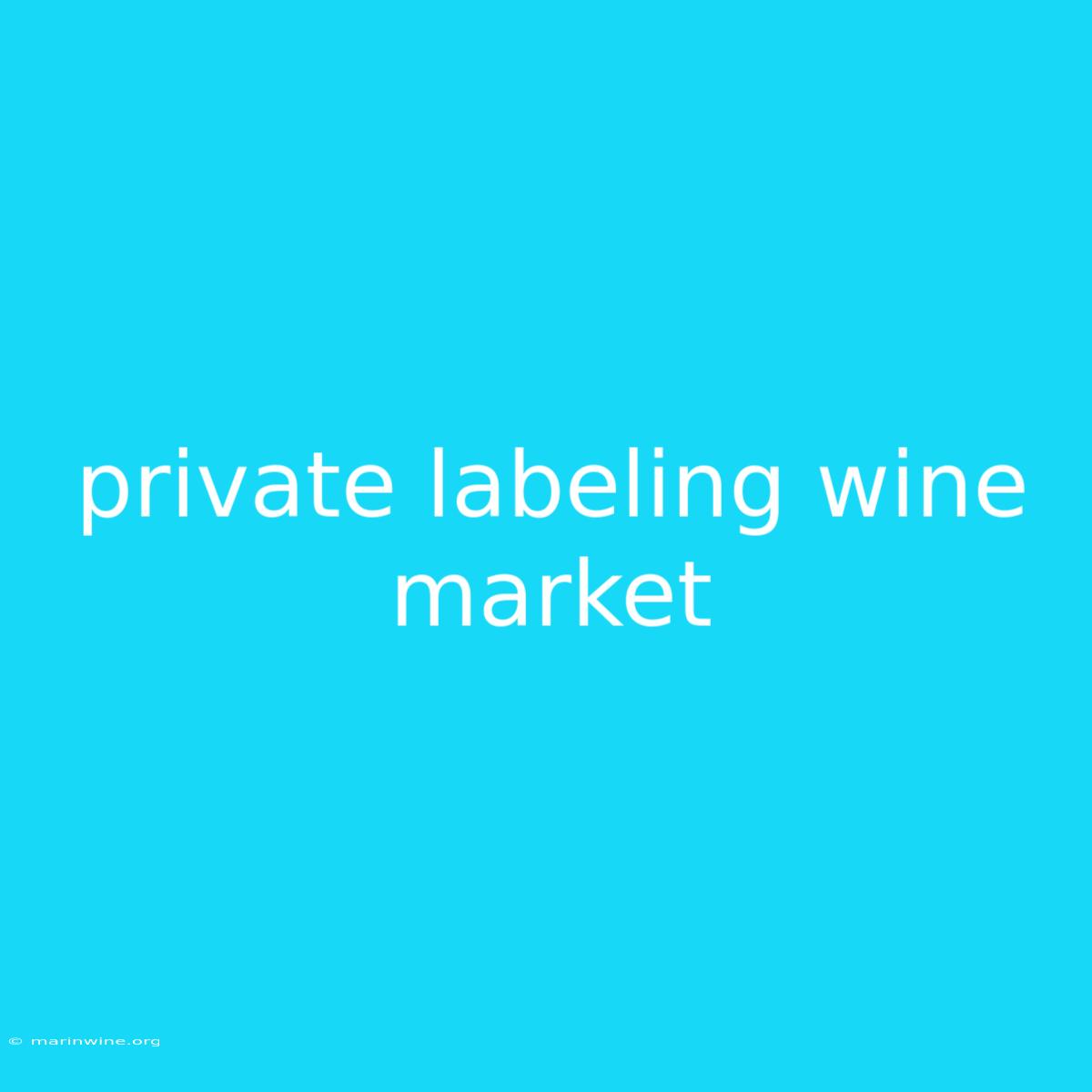Uncorking Success: A Deep Dive into the Private Label Wine Market
Have you ever wondered why some seemingly generic wines on supermarket shelves are surprisingly good? The answer might lie in the world of private label wines. This growing market offers a unique opportunity for businesses to create their own branded wines, capturing a loyal customer base and maximizing profit.
Why It Matters: The private label wine market is more than just a trend – it's a powerful strategy for businesses of all sizes. This market allows businesses to control every aspect of their wine, from grape selection to label design, creating a distinctive brand experience for consumers. By understanding the key factors and opportunities within this market, businesses can gain a competitive edge in the fiercely contested world of wine.
Key Takeaways of Private Label Wine:
| Aspect | Description |
|---|---|
| Growth Potential | Strong demand for unique and affordable wine options. |
| Customization Options | Control over every aspect of the wine, from grape variety to label. |
| Cost-Effectiveness | Potentially lower costs compared to traditional wine brands. |
| Brand Building | Opportunity to create a distinct brand identity. |
The Private Label Wine Market: Unveiling the Secrets
Understanding the Market
The private label wine market is a dynamic landscape driven by a confluence of factors:
- Growing Demand for Value: Consumers are increasingly looking for high-quality wines at affordable prices, making private label wines an attractive option.
- Increased Consumer Interest in Specific Wine Styles: This growing demand allows businesses to cater to niche markets and offer specialized wine experiences.
- Focus on Brand Building: Private label wines allow businesses to build their own brand identity, fostering customer loyalty and creating a unique selling proposition.
Key Aspects of Private Label Wine
1. Production and Sourcing:
- Contract Winemakers: Most private label wines are produced by contract winemakers, who specialize in crafting wines for various brands.
- Regional Focus: Businesses can leverage local grape varieties and winemaking traditions to create wines that reflect their brand's unique identity.
2. Labeling and Packaging:
- Branding Strategy: The label is a crucial aspect of brand building, conveying the wine's style, region, and story.
- Packaging Design: The bottle shape, cork, and overall packaging play a vital role in creating a cohesive brand experience.
3. Marketing and Distribution:
- Target Market: Businesses need to clearly define their target audience and tailor their marketing efforts to resonate with them.
- Retail Partnerships: Securing partnerships with retailers is essential for reaching consumers and creating brand visibility.
The Connection between Private Label Wine and Brand Success
The private label wine market allows businesses to leverage a powerful tool for branding success. Here's how:
- Control Over Every Aspect: From grape selection to label design, businesses maintain complete control over their wine, fostering a strong brand identity.
- Storytelling Through Wine: Businesses can weave their brand story into the wine's origin, production, and tasting notes, creating a compelling narrative for consumers.
- Building Relationships: By offering unique and high-quality wines, businesses cultivate customer loyalty and build meaningful relationships with consumers.
FAQ for the Private Label Wine Market
Q1. How do I find a reputable winemaker for my private label project?
A1. Research is key! Look for winemakers with experience in crafting the specific wine style you desire. Consider visiting wineries, attending industry events, and seeking recommendations from industry experts.
Q2. What are the typical costs involved in creating a private label wine?
A2. Costs can vary depending on grape selection, production methods, bottle size, label design, and marketing efforts. Consulting with a reputable winemaker and packaging supplier will provide a more accurate estimate.
Q3. What are the regulations surrounding private label wines?
A3. Regulations can vary by country and region. It's essential to consult with local authorities to ensure compliance with labeling requirements and other legal specifications.
Q4. How do I market my private label wine effectively?
A4. Focus on creating a compelling brand story and leveraging online and offline marketing strategies. Consider social media, targeted advertising, and partnerships with retailers to reach your target audience.
Q5. What are the potential risks involved in entering the private label wine market?
A5. Risks include competition from established brands, managing production and inventory, and ensuring consistent quality. Careful planning and strong partnerships can mitigate these risks.
Q6. What are the benefits of selling private label wine?
A6. Private label wines offer a unique opportunity to build brand recognition, control quality, and differentiate your products in a crowded marketplace.
Tips for Navigating the Private Label Wine Market
1. Conduct Thorough Research: Explore the wine market, identify your target audience, and analyze the competition. 2. Partner with the Right Winemaker: Choose a winemaker who understands your brand vision and can produce wines that meet your quality standards. 3. Create a Compelling Brand Story: Develop a clear and engaging narrative that resonates with your target market. 4. Invest in Effective Packaging: The label, bottle shape, and overall packaging should convey your brand identity and appeal to your target audience. 5. Develop a Strong Marketing Strategy: Leverage digital and traditional marketing tactics to reach your target market and build brand awareness.
Summary of Private Label Wine
The private label wine market offers a promising avenue for businesses seeking to establish their own unique wine brands. By understanding the key aspects, navigating the production and marketing processes, and leveraging the power of branding, businesses can tap into this lucrative market and achieve sustainable success.
Closing Message: The world of wine is brimming with potential. By embracing the opportunity to create your own private label wine, you can unlock a new level of brand recognition, customer loyalty, and ultimately, success.

